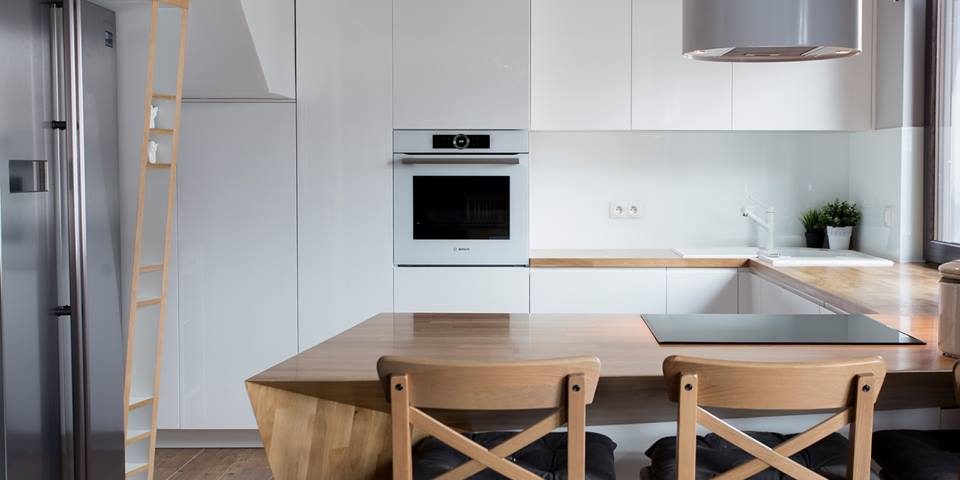In this text, we want to introduce you to the available types of kitchen countertops. Choosing a countertop is incredibly important because it is a heavily used element of the kitchen. Hot dishes can be placed on the countertops, and they regularly come into contact with water, steam, and sharp tools.
When choosing a countertop, remember to pay attention to parameters such as:
- Moisture resistance
- Resistance to mechanical damage
- High-temperature resistance
- Easy to clean
- Possibility of renewing the countertop
- Available colors
- Countertop price
Basic types of kitchen countertops:
1) Composite Countertops
A durable, non-porous, and uniform surface material. A mixture of acrylic resin and natural minerals. These types of countertops are characterized by high durability. They are resistant to mechanical damage and UV radiation, have a smooth surface, are hygienic and non-toxic, susceptible to sublimation, and are also fully environmentally friendly.
Another advantage of composite countertops is their ease of repair or renewal.
2) Granite Countertops
Granite is a natural stone, so these countertops are characterized by very high resistance to mechanical damage and are incredibly durable and will serve us for many years. Granite countertops are resistant to high temperatures, moisture, and are easy to clean (dirt and bacteria do not penetrate them).
Thanks to the rich range of patterns and colors, you can choose a countertop that fits perfectly with a particular kitchen. Granite countertops will work great in an elegant, exclusive kitchen.
3) Quartz Countertops
A very popular solution. This type of countertop is appreciated primarily for its high durability (a result of combining the latest technology with natural ingredients). Quartz countertops are resistant to high temperatures (up to 200 degrees), UV radiation, stains, impacts, scratches, and abrasion. They also have low water absorption.
Countertops are available in a universal, uniform color.
4) Laminated countertops
They are made on the basis of a three-layer chipboard or MDF board. The board is covered on one or both sides with laminate.
Laminated countertops are resistant to high temperatures (up to 170 degrees) and UV rays. They are easy to install and relatively cheap. Unfortunately, they are characterized by low scratch resistance, there is no possibility of repairing the countertop, and incorrect use may cause the material to swell (due to water or steam).
5) Steel countertops
Although steel countertops are most often used in professional kitchens, they are increasingly appearing in homes. Their advantages include ease of cleaning, very high resistance to temperatures, and resistance to staining liquids.
Steel countertops are cold to the touch and are not scratch-resistant, and are sensitive to scrubbing and abrasive agents.
6) Wooden countertops
They are great for warm, friendly style interiors. They require proper care – they must be regularly impregnated (especially properly impregnated before installation), and it is also worth making sure that the temperature in the room is not too high (this can cause the wood to shrink).
Wooden countertops are durable and can be renewed. Unfortunately, they are prone to staining, have low resistance to high temperatures (care should be taken, among other things, with hot pots), are easily scratched (especially if covered with varnish). Solid countertops can also warp.
7) Countertops made of quartz composite
A solution that is very popular. Countertops made of natural materials such as quartz, slate, granite rocks, and ceramic pigments. Countertops of this type are resistant to wear and scratches (except for scratches made by ceramic knives) and UV radiation. They do not react with food, there is no mold or fungus on them. In the case of quartz composite countertops, natural design is used.
Their disadvantage is sensitivity to point impacts.
8) Glass countertops
They are made to individual order. Laminated and tempered glass is used for their production. Glass countertops are durable and characterized by high resistance to both scratches and impacts. They are also resistant to the effects of juices, acids, detergents, and high temperatures. An additional advantage of glass countertops is that they are easy to clean.
9) Concrete countertops
This type of countertops is a modern trend. They are made from the highest quality raw materials. They are reinforced with fiberglass, resistant to scratches, wear, impacts, and high temperatures. Natural discolorations and abrasions give this type of countertops an individual character.
Their disadvantage is low resistance to acid. They are very heavy and require continuous cleaning. Discoloration may also appear on concrete countertops.



